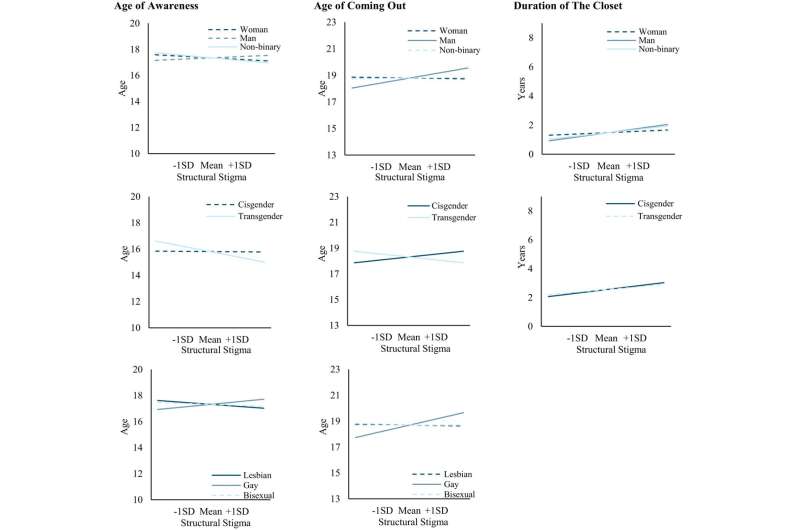This article has been reviewed according to Science X's editorial process and policies. Editors have highlighted the following attributes while ensuring the content's credibility:
fact-checked
peer-reviewed publication
trusted source
proofread
Research empirically shows structural discrimination negatively impacts LGB youth and adults

In a new, first-of-its-kind study published in the Journal of Youth and Adolescence, University of Delaware Assistant Professor Eric K. Layland and co-authors Richard Bränström of the Karolinska Institutet, and Gabriel Murchison and John Pachankis of Yale University have investigated the timing of developmental milestones for more than 100,000 lesbian, gay and bisexual (LGB) adolescents and adults across 28 European countries.
They found that discriminatory laws and policies at the country levels were associated with the timing of LGB self-awareness (when a person recognizes that they are lesbian, gay or bisexual), the disclosure of sexual identity ("coming out") and the amount of time between LGB self-awareness and disclosure (time spent "in the closet" or "closet duration").
Greater structural stigma, defined by the absence of LGB protective laws (such as the absence of same-sex marriage and conversion therapy bans, for example), was associated with later age of coming out, longer closet duration and higher odds.
"This study provides evidence that supports the belief of researchers and advocates that national policies protecting the human rights of lesbian, gay and bisexual people have an impact on individual development," Professor Layland said.
"For LGB people, many of these identity and social milestones occur during the critical developmental period of adolescence. Results of this study add to other research showing protective policy can benefit LGB health by showing more protective policy can contribute to an environment where young LGB people can openly share their identity with others and spend less time in isolation."
For this study, Layland and his co-authors used data gathered by the European Union Agency for Fundamental Human Rights on LGB participants' age, gender identity, sexual identity and the relevant developmental milestones. These data were from the European Union Lesbian, Gay, Bisexual, Transgender and Intersex (EU-LGBTI) Survey II, which was administered online between May and July 2019.
The overall purpose of the survey was to monitor the fundamental rights affecting lesbian, gay, bisexual, transgender and intersex (LGBTI) people across European Union member states. The survey was developed by a cross-European team of LGBTI topic experts and translated into 31 languages. In total, 137,508 participants across the 28 EU countries responded, including participants from adolescence to older adults.
More information: E. K. Layland et al, Kept in the Closet: Structural Stigma and the Timing of Sexual Minority Developmental Milestones Across 28 European Countries, Journal of Youth and Adolescence (2023). DOI: 10.1007/s10964-023-01818-2





















